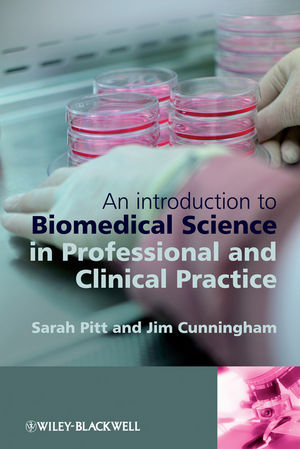An Introduction to Biomedical Science in Professional and Clinical PracticeISBN: 978-0-470-05715-5
Paperback
240 pages
April 2009
 This is a Print-on-Demand title. It will be printed specifically to fill your order. Please allow an additional 10-15 days delivery time. The book is not returnable.
Other Available Formats: Hardcover
|
||||||
Preface xi
Acknowledgements xiii
1 Introduction to a career as a biomedical scientist 1
1.1 What is a biomedical scientist? 1
1.2 Early development of clinical laboratory sciences 3
1.3 Development of the biomedical science profession 5
1.4 Role of the IBMS as the professional body for biomedical scientists in the 21st Century 7
1.5 Health Professions Council 11
1.6 Education and training for biomedical scientists 17
1.7 Codes of conduct 21
1.8 Conclusion 22
Quick quiz 23
Coursework exercises 23
Suggested references 23
2 Organization of pathology departments and the role of pathology in healthcare 25
2.1 Introduction 25
2.2 Organization of pathology departments 25
2.3 Staff groups within pathology 26
2.4 Role of pathology in healthcare 37
2.5 Users of the service 40
2.6 Evidence-based laboratory medicine 44
2.7 Improving the pathology service 48
2.8 Point of care testing (POCT) 50
2.9 Role of POCT in patient care 52
2.10 Conclusion 54
Quick quiz 54
Suggested exercises 55
Suggested references 55
3 Communication for biomedical scientists 57
3.1 Introduction 57
3.2 Communicating as a scientist 58
3.3 Communicating as a healthcare professional 58
3.4 Delivering the message: applying principles of effective communication 60
3.5 Communication techniques 68
3.6 Conclusion 81
Quick quiz 81
Suggested exercises 82
Suggested references 83
4 Quality management in the clinical laboratory 85
4.1 Introduction 85
4.2 Quality in pathology 85
4.3 Quality Control 88
4.4 Quality Assurance 93
4.5 Quality assessment 98
4.6 Quality audit 101
4.7 Clinical governance 104
4.8 Quality management system (QMS) 106
4.9 Accreditation 107
4.10 Factors affecting the quality of work in a pathology laboratory 111
Quick quiz 112
Suggested exercises 113
Suggested references 115
5 Basic principles of working in a clinical pathology laboratory 117
5.1 Introduction 117
5.2 Working as a professional biomedical scientist in the laboratory 118
5.3 Flow of work in a clinical laboratory 119
5.4 Health and safety in the clinical laboratory 136
5.5 Confidentiality, the Data Protection Act 1998 and the Caldicott
Principles 139
Quick quiz 141
Suggested exercises 142
Suggested references 142
6 Introduction to the biomedical science disciplines 145
6.1 Introduction 145
6.2 Haematology and transfusion science 147
6.3 Clinical biochemistry 154
6.4 Histopathology and cytopathology 159
6.5 Medical microbiology 165
6.6 Liaison between pathology disciplines 171
6.7 Evaluation of a new diagnostic test 171
6.8 Sensitivity and specificity of an assay 173
Quick quiz 176
Suggested exercises 177
Suggested references 177
7 Biomedical science laboratory techniques 179
7.1 Introduction 179
7.2 Haematology 181
7.3 Clinical chemistry 187
7.4 Medical microbiology 192
7.5 Histopathology 194
Suggested references 199
8 Development of knowledge and competency for biomedical scientists 201
8.1 Introduction 201
8.2 Gathering evidence of knowledge and competency for HPC registration 202
8.3 Continuing professional development 204
8.4 Professional body support for CPD 206
8.5 Reflective practice for biomedical scientists 208
8.6 Approaches to reflective practice 209
8.7 Critical incident analysis 211
8.8 Learning styles 213
8.9 Planning a career as a biomedical scientist; generic skills and employability 215
8.10 Conclusion 217
Quick quiz 217
Suggested exercises 218
Suggested references 218
Index 219



